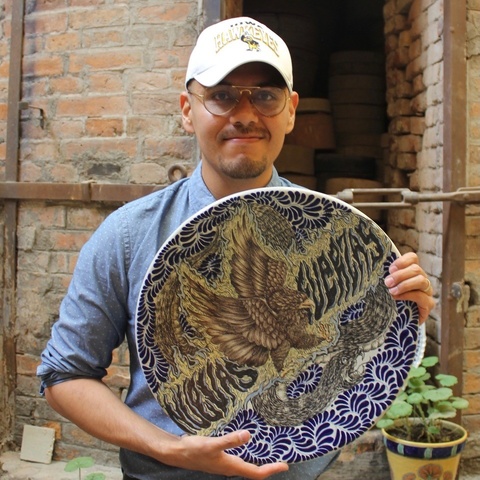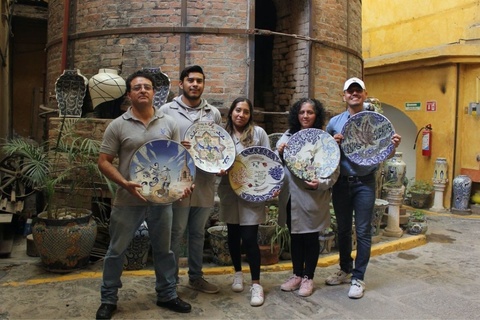Graduate student Javier Espinosa Momox traveled to Puebla, Mexico this summer with the goal of shedding light on the work of local Talavera ceramic artists.

He returned with photos and stories from a plethora of Pueblan artists, which he incorporated in a workshop project titled “Herencia Means Heritage.” Momox is in the second year of the graduate program in the School of Art and Art History within the College of Liberal Arts and Science.
Talavera is a traditional form of handmade, hand-painted Mexican pottery characterized by its bright colors and intricate patterns.
“I used to be a Talavera artist, and one thing I noticed was that so many artisans are very neglected,” says Momox, whose research interest is ceramics. “They’re not recognized for what they do, even though they do a lot of work. The main purpose of this project was to bring recognition to these neglected crafters.”
According to Momox, many of the practitioners of Talavera have been active in it for upwards of 30 years—however, for many of them, the repetitive nature of the Talavera business has made it difficult to imbue their own creativity and passion into the art.
“The project was about creating a workshop with them and talking about what their concerns were and giving the opportunity to them to create a piece of art, which is something they don’t have the chance to do all the time,” says Momox. “For them it’s more about mechanical work, more about doing the same job over and over again without really putting emotions or ideas into pieces. It’s normal for us artists to talk about ourselves and identity in our work, but that is something that they basically don’t get the chance to do.”
Momox’s trip to Puebla was funded by the Stanley Award for International Research, a grant given to both undergraduate and graduate students at the University of Iowa who show interest in opportunities outside of the United States. Momox was one of 22 winners of the award for 2023.

During the course of this project, Momox was advised by associate professor Andrew Casto, who is also the area head of ceramics and director of undergraduate studies at the School of Art and Art History.
“I find Javier’s work to be exceptionally well considered and executed,” says Casto. “Only he could have conceived of this idea. His connection to Talavera pottery, his history as a practitioner of this Mexican art form, as well as his current body of contemporary art in ceramics form a unique skillset that make him unlike anyone I’ve ever worked with.”
Casto also says that, with Momox’s help, he applied for an Arts and Humanities Initiative Major Conference Grant to bring the Talavera artists that Momox worked with to Iowa in 2024 to be in conversation with others specializing in the history of Talavera. If approved, this proposal would fund a three-day event featuring demonstrations and lectures and would be done in partnership with the Stanley Museum of Art, who would showcase works created during the conference.
Momox is especially grateful for the support he received from the university during this time, from the Stanley Award and Casto alike, saying, “I’m very impressed how much the university invests in research; it’s very helpful.”
But Momox says his work on the project is far from done. He intends to expand on his research and work with Talavera in order to continue bringing attention to artists like those in Puebla.
“This isn’t just a research project,” explains Momox. “It’s social justice. It’s drawing the focus to those who have been neglected for so long. Projects like this need to be supported, because they create not just knowledge, but also social justice.”
For more information on “Herencia Means Heritage,” watch Momox’s video review of the project.